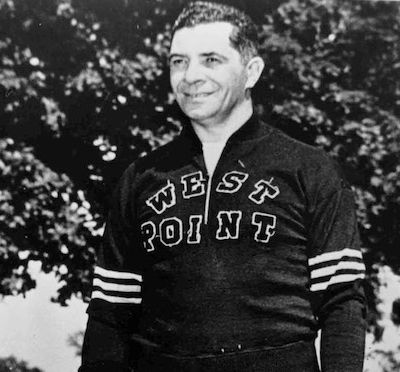Authors:
Historic Era: Era 10: Contemporary United States (1968 to the present)
Historic Theme:
Subject:
Summer 2017 | Volume 62, Issue 1


Authors:
Historic Era: Era 10: Contemporary United States (1968 to the present)
Historic Theme:
Subject:
Summer 2017 | Volume 62, Issue 1

This essay is part of a series of articles written by the readers of American Heritage entitled "My Brush with History" in which they recall meeting a famous personality or playing a small part of a momentous event. We invite our readers to continue to submit ideas to editor [at] americanheritage.com.
Early in the second month of 1953, I was summoned from study hall at White Plains High School. A college football coach wanted to see me.
Such recruiting visits were commonplace because the school’s football team had not lost a game during my three years there. Our quarterback, the high school coach’s son, was chosen as a high school All-American in his senior year. I played center and received my share of recruiting attention as a result of that reflected glory. One head coach, whose undefeated 1952 team was ranked number one, had offered to put me through a Baltimore law school if I would play for him. (I didn’t accept the offer and learned only years later that the law school was not accredited.)
However, the coach I was summoned from study hall to meet that day in 1953 was different. He was not a head coach, and his team was a long way from a number-one ranking. The U.S. Military Academy at West Point (Army), where he was an assistant, had Columbia and Penn on its football schedule, and its team was not the powerhouse it had been in the forties.
But the coach I met that day was different in more important ways. Although he was obviously interested in me, he made no easy pledges of future help. Nor did he sugarcoat what West Point had to offer, or what it required. First and foremost, he told me, you were in the Army, and basic training was your initial obligation. Football would have to come later.
That coach, with thick glasses and black, curly hair, stood out over the years in my memory even though I soon forgot his name. He was the most honest person I met during that recruiting period. I had encountered a man of character, and even the obtuseness of adolescence could not hide that fact from me.
It took almost 30 years for me to realize who it was I had met that day. The revelation came by accident, and in some ways it was disturbing.
While watching a football game on television with my brother-in-law at my mother’s house, I told him about a kind letter I had received from the coach at USC when I sought a college transfer back in the fifties. In an effort to produce the letter,